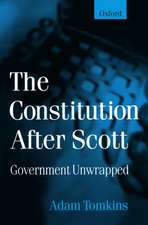No Island of Sanity: The Supreme Court on Trial: Library of Contemporary Thought
Autor Vincent Bugliosien Limba Engleză Paperback – 31 ian 1998
--from NO ISLAND OF SANITY
Now, in the powerful premiere of the Library of Contemporary Thought, Vincent Bugliosi takes a timely swipe at the Supreme Court's decision in Paula Jones v. Bill Clinton. Famed as the prosecutor of Charles Manson and author of the classic bestseller HELTER SKELTER, Bugliosi argues that the high court has rarely been proved so wrong, so fast.
NO ISLAND OF SANITY is only the beginning of an ongoing dialogue with some of the most original writers working today. Each month, the Library of Contemporary Thought will bring you a different voice on a hot-button topic in American life, politics, and culture. From Mickey Mouse to Tiger Woods, from how we age to how we read, no subject is too controversial or too unlikely for these powerful and provocative books.
Preț: 85.58 lei
Nou
Puncte Express: 128
Preț estimativ în valută:
16.38€ • 17.14$ • 13.55£
16.38€ • 17.14$ • 13.55£
Carte disponibilă
Livrare economică 17-31 martie
Preluare comenzi: 021 569.72.76
Specificații
ISBN-13: 9780345424877
ISBN-10: 0345424875
Pagini: 160
Dimensiuni: 157 x 219 x 10 mm
Greutate: 0.21 kg
Editura: BALLANTINE BOOKS
Seria Library of Contemporary Thought
ISBN-10: 0345424875
Pagini: 160
Dimensiuni: 157 x 219 x 10 mm
Greutate: 0.21 kg
Editura: BALLANTINE BOOKS
Seria Library of Contemporary Thought
Notă biografică
Vincent Bugliosi received his law degree in 1964 from the UCLA Law School. In his career as a prosecutor for the Los Angeles Country District Attorney's office, he won 105 out of 106 felony jury trials. His most famous trial was the Charles Manson case, which became the basis of his classic bestselling book, Helter Skelter. Both Helter Skelter and his subsequent Till Death Do Us Part won Edgar Allan Poe Awards for best true-crime book of the year. His next true-crime book, And the Sea Will Tell, was #1 on the New York Times hardcover bestseller list, as was his most recent book, Outrage: The Five Reasons Why O. J. Simpson Got Away With Murder.
Extras
...I have yet to read one single article, anywhere, criticizing the Supreme Court for its ruling in the case. (In fact, as we will see later on, even many who were upset with the Court's ruling and regretted its potential adverse implications went on to conclude that the Court was nevertheless legally correct in its ruling.) But by the time readers finish this book I'm confident that most of them will be highly condemnatory of the Supreme Court, some even angry at the Court, for its ruling in the Paula Jones case.
About no one else seeing the error: Let me qualify this. I would guess that some constitutional law professors, somewhere, saw it. But I can tell you who didn't--no one in the media that I'm aware of, including the major newspapers of the land and political pundits, saw it. The president's own lawyer, Robert S. Bennett, didn't see it. Much more important, the Supreme
Court of the United States, which handed down the ruling, didn't see it. As a result, the highest court in our land made an incomprehensible and terribly flawed decision against the nation's most powerful and important citizen, one that has injurious ramifications for all of us.
It should be noted off the top that the position taken in this book has nothing at all to do with being pro-Clinton or pro-Democrat. It has everything to do with the office of the presidency of the United States. In fact, during Watergate, with a Republican president, I became so upset with people treating the matter as though it was so much more serious than
it really was (prosecutor Leon Jaworski, incredibly, analogized it to the Third Reich, which resulted, as we know, in fifty million deaths during World War II, including the six million Jews murdered during the Holocaust) and with politicians (who, if the truth be told, had covered up their own misconduct) reacting with phony horror over the president's malfeasances (e.g., Senator Ted Kennedy, who did everything within his power to suppress the facts of Chappaquiddick) that I wanted to write a book titled Watergate: America's Finest Hour of Hypocrisy, but prior commitments prevented me from doing so.
I believe I can establish conclusively that the Supreme Court's decision in this case was terribly and demonstrably wrong. The reason is that the Court failed to balance, as it must always do, the public interest against the private interest; here, the public interest in the effective functioning of the office of the presidency against the private interest of Paula Jones to have her case heard, without further delay, during the president's term in office. One could perhaps say that because I am not a
constitutional scholar or even an appellate lawyer, just a plain trial lawyer, I am out of my depth in taking on the highest court in the land in this case. But in this instance, the Jones v. Clinton case, the depth is so shallow that anyone using even an ounce of common sense could navigate its weak currents. This is not the type of situation where the Supreme Court has issued a ruling with which those who disagree question the Court's analysis and interpretation of the legal issues before it. This happens every day; people see things differently all the time. This is a situation where, for instance, the judge of a professional fight never even added up his scorecard correctly, giving only one point, instead of the two he should have, to a knockdown in the third round. In other words, this is a ruling that is fatally defective, one no rational person can fail to condemn once he or she becomes aware of what the Supreme Court actually did in this case. The error was so flagrant that virtually everyone should have seen it. But they didn't.
And that leads me, before we get into a fairly detailed examination of the Court's decision, into a discussion of two prefatory matters, the first of which is to try to explain why no one whom I'm aware of has been talking about the Supreme Court's terrible blunder in the Paula Jones case (and by extension, why no one saw the incompetence of the prosecutors in the
Simpson case). The second concerns a frightening reality about the direction of American life.
About no one else seeing the error: Let me qualify this. I would guess that some constitutional law professors, somewhere, saw it. But I can tell you who didn't--no one in the media that I'm aware of, including the major newspapers of the land and political pundits, saw it. The president's own lawyer, Robert S. Bennett, didn't see it. Much more important, the Supreme
Court of the United States, which handed down the ruling, didn't see it. As a result, the highest court in our land made an incomprehensible and terribly flawed decision against the nation's most powerful and important citizen, one that has injurious ramifications for all of us.
It should be noted off the top that the position taken in this book has nothing at all to do with being pro-Clinton or pro-Democrat. It has everything to do with the office of the presidency of the United States. In fact, during Watergate, with a Republican president, I became so upset with people treating the matter as though it was so much more serious than
it really was (prosecutor Leon Jaworski, incredibly, analogized it to the Third Reich, which resulted, as we know, in fifty million deaths during World War II, including the six million Jews murdered during the Holocaust) and with politicians (who, if the truth be told, had covered up their own misconduct) reacting with phony horror over the president's malfeasances (e.g., Senator Ted Kennedy, who did everything within his power to suppress the facts of Chappaquiddick) that I wanted to write a book titled Watergate: America's Finest Hour of Hypocrisy, but prior commitments prevented me from doing so.
I believe I can establish conclusively that the Supreme Court's decision in this case was terribly and demonstrably wrong. The reason is that the Court failed to balance, as it must always do, the public interest against the private interest; here, the public interest in the effective functioning of the office of the presidency against the private interest of Paula Jones to have her case heard, without further delay, during the president's term in office. One could perhaps say that because I am not a
constitutional scholar or even an appellate lawyer, just a plain trial lawyer, I am out of my depth in taking on the highest court in the land in this case. But in this instance, the Jones v. Clinton case, the depth is so shallow that anyone using even an ounce of common sense could navigate its weak currents. This is not the type of situation where the Supreme Court has issued a ruling with which those who disagree question the Court's analysis and interpretation of the legal issues before it. This happens every day; people see things differently all the time. This is a situation where, for instance, the judge of a professional fight never even added up his scorecard correctly, giving only one point, instead of the two he should have, to a knockdown in the third round. In other words, this is a ruling that is fatally defective, one no rational person can fail to condemn once he or she becomes aware of what the Supreme Court actually did in this case. The error was so flagrant that virtually everyone should have seen it. But they didn't.
And that leads me, before we get into a fairly detailed examination of the Court's decision, into a discussion of two prefatory matters, the first of which is to try to explain why no one whom I'm aware of has been talking about the Supreme Court's terrible blunder in the Paula Jones case (and by extension, why no one saw the incompetence of the prosecutors in the
Simpson case). The second concerns a frightening reality about the direction of American life.
Descriere
The Library of Contemporary Thought is an important new series that gives top opinion makers a forum to explore topics that matter urgently to them and their readers. In this volume, well-known attorney and author Vincent Bugliosi delivers a searing indictment of the Supreme Court's arrogance (and ignorance) in the Paula Jones v. Bill Clinton case. Available



















